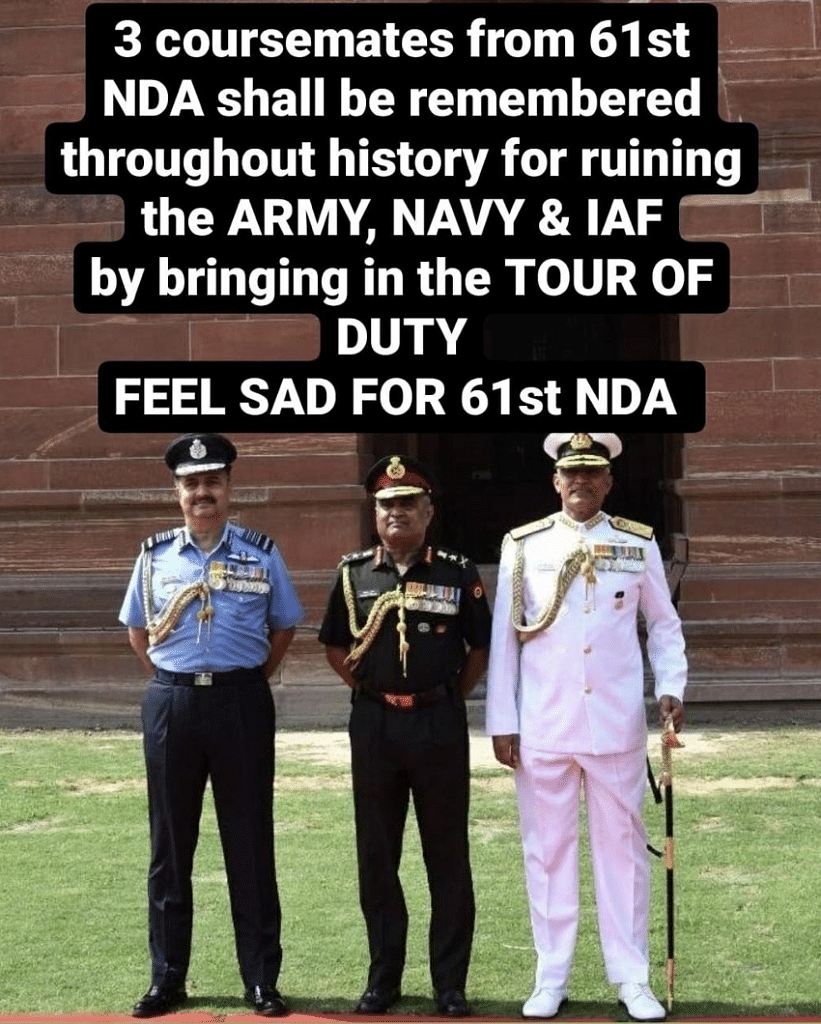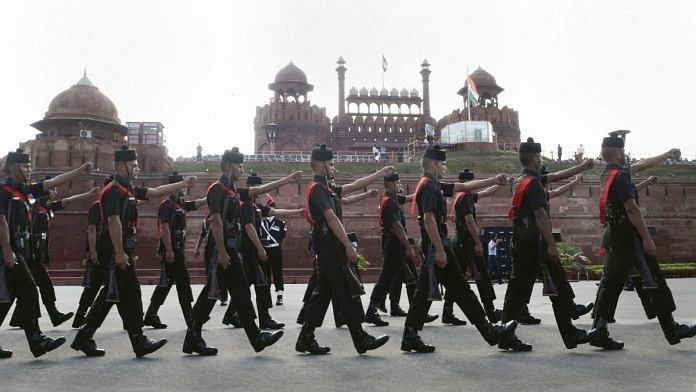This is an imaginary letter from an Adjutant General about the Narendra Modi government’s Agnipath scheme.
This is one of those ‘I write with a heavy heart’ letters, but I am writing it to myself, to an inner something — rarely seen but which exerts enormous pressure. Especially when it comes to matters of soldiering, something which I’ve been doing for more than 35 years. Now I’m at the fag end of my career, and dealing with a decision that pricks my conscience like nothing else has in all these years of service. As a second Lieutenant in Sri Lanka during Operation Pawan, I felt no pangs of conscience; after that on Siachen, there was only rage against Pakistan.
During counter-insurgency operations in Nagaland and Kashmir, there were moments when something stirred inside and bothered me. But then I was fired at, by weapons and ammunition sourced outside of India, so the conscience hurt only momentarily. We were defending the country against those who didn’t accept the idea of India, so all was ultimately kosher. But now as Adjutant General, I’m dealing with a matter that hurts the insides and is humiliating as well worrisome. Especially when veterans’ groups post pictures like this:

The thrill and pride of seeing three chiefs from the 1st Course in 1991 is now forgotten.
As AG, my branch will now issue orders to recruit young boys for four years under a scheme named like some Hindi movie—Agnipath. This includes six months of training, way too little. Training centres take about ten months to prepare a soldier with basic military skills, just basic. Hell, that Delhi Police constable deployed outside my house in Lutyens’ Delhi when the Prime Minister’s cavalcade moves has been trained longer than these poor boys will. So whoever thought that 18-year-olds, with six months of training, will be worthy of kasam parade, really doesn’t know the Army, and never will.
Also read: Agnipath scheme is proof that Modi govt can bring change for good. But an open mind is key
‘Four-year interns’
It is distressing to be on this chair and sign off these youngsters, which is really what it is — making them redundant. No battalion receiving these soldiers will accept them. They won’t be rejected of course, but they will not be accepted in an emotional sense, for being unprepared. The Company Havaldar-Major will, of course, say it far more crudely, and more accurately than me. And by the time they leave after four years, it would be sans skills or embrace. They won’t be able to take the bonds of service with them, because they will remain unbaked.
Twenty years in an infantry battalion, I know a lot more about bonding than any civilian. The bonds began fairly early in service, within the officer fraternity and with the soldiers. Gunasekharan onwards every buddy kept my wallet, freely using it to pay bills. I still remember Dar beating up a Kashmiri man who drew blood when he bit my hand. Both may well have been from the same district, but the bonds of uniform are deeper than blood. Or Shamsuddin stepping up to do the cremation ceremony of Ramesh Kumar by the Lidder River because bodies weren’t sent home then.
These new-age soldiers, or four-year interns as some veterans call them, will not learn this bonding. They wouldn’t even be able to absorb the ethos of the unit before their tenure finishes. The brain behind this scheme is clearly some civilian too, clear by half.
Also read: Schemes like Agnipath must go to test beds first. They shake up the entire system
What happens to the combat unit?
India seems obsessed with ‘reforms’, whatever that may mean. My soldiers coming from home leave would always complain about harassment by revenue officials or police, the two biggest concerns in rural India. Both these departments remain untouched in terms of reforms, and fiddling with the Army seems to be the only focus.
Pension and modernisation is the much-touted reason behind Agnipath. But there is another deeper, and more worrisome, reason. It is the unease that civilians feel when it comes to military culture. There is something alien about the Army for them, and so they conveniently label it ‘colonial’. Forgetting for a moment that the Army is a continuum from well before any ‘foreigner’ invaded India, and it has existed in various forms throughout history. The English were simply clever in absorbing the deep Indian ethos into the Army and gave them regimental names and numbers. Nothing more nothing less.
This four-year scheme is actually an assault on the culture and makeup of the Army. Within a combat unit, it is impossible for soldiers to operate together when on different employment contracts. The seasoned soldier won’t trust the ‘intern’ with his life, and the ‘intern’ will reciprocate by not taking a risk with his life. Simple as that. But the economist with a foreign degree who cooked up this scheme will never understand that simple equation because they haven’t had that bond sharpened by hot lead. As AG, this breakdown of unit cohesion is the biggest worry.
So now I remember the humiliation burning into my cheeks when the private secretary to the defence minister had said something to me about Pay Commission issues raging then. He said, you keep talking about military leadership but the Generals asking me about their pay haven’t asked about soldiers’ salaries. Being an IAS officer, he, of course, loved the opportunity to rub this into me. And in a way, this continues even today as we Generals endorse a disaster on our institution, while the retired soldiers are the most vocal in their opposition. They outdo the retired Generals too, who seem rather tepid.
In the last few years, we have stopped mobile canteen sales for veterans in villages by an order of the QMG’s Branch. Then we stopped recruitment for over two years leaving thousands in the lurch, with the clock ticking toward over-age. And that was the failure of my branch. But this ‘intern’ scheme outdoes even those errors. I wonder if my equivalent colleagues in the Navy and Air Force fret over this decision as I do. They must, for we all have a conscience, and as warriors, we have a greater responsibility to give India the best we can.
Manvendra Singh is a Congress leader, Editor-in-Chief of Defence & Security Alert and Chairman, Soldier Welfare Advisory Committee, Rajasthan. He tweets @ManvendraJasol. The author is not the Adjutant General, nor has ever been one. Names and events quoted in the article are imaginary. Views are personal.



